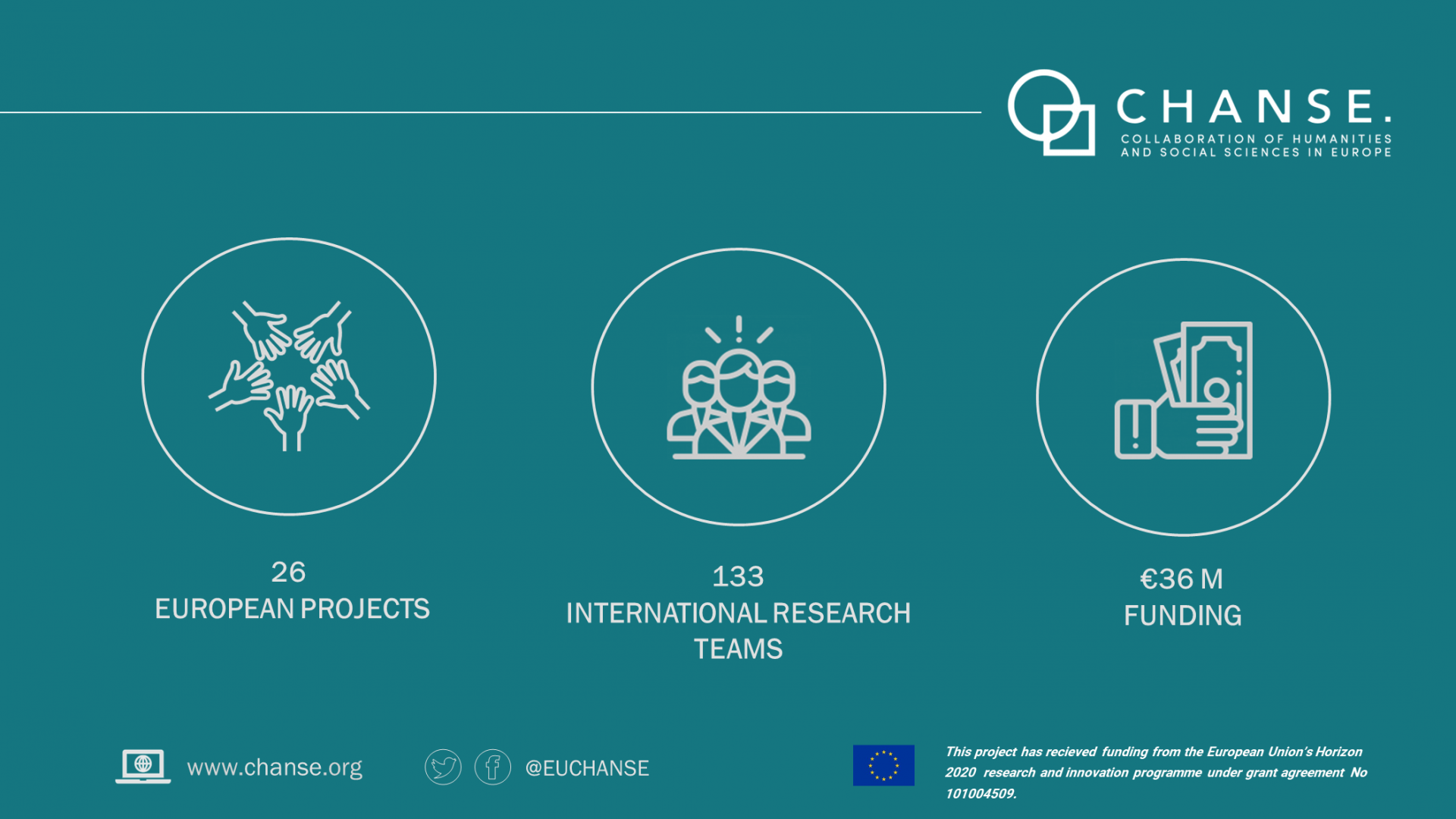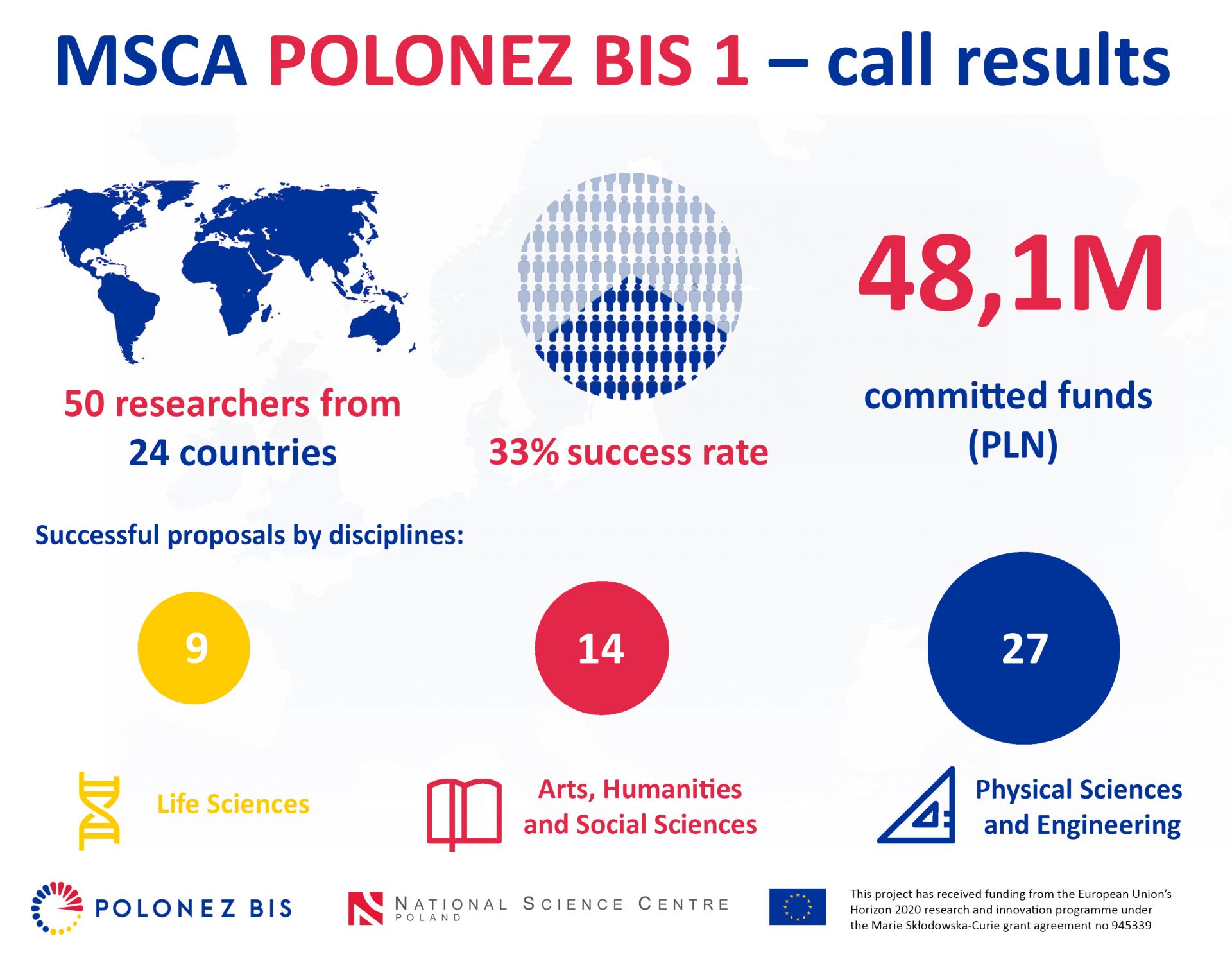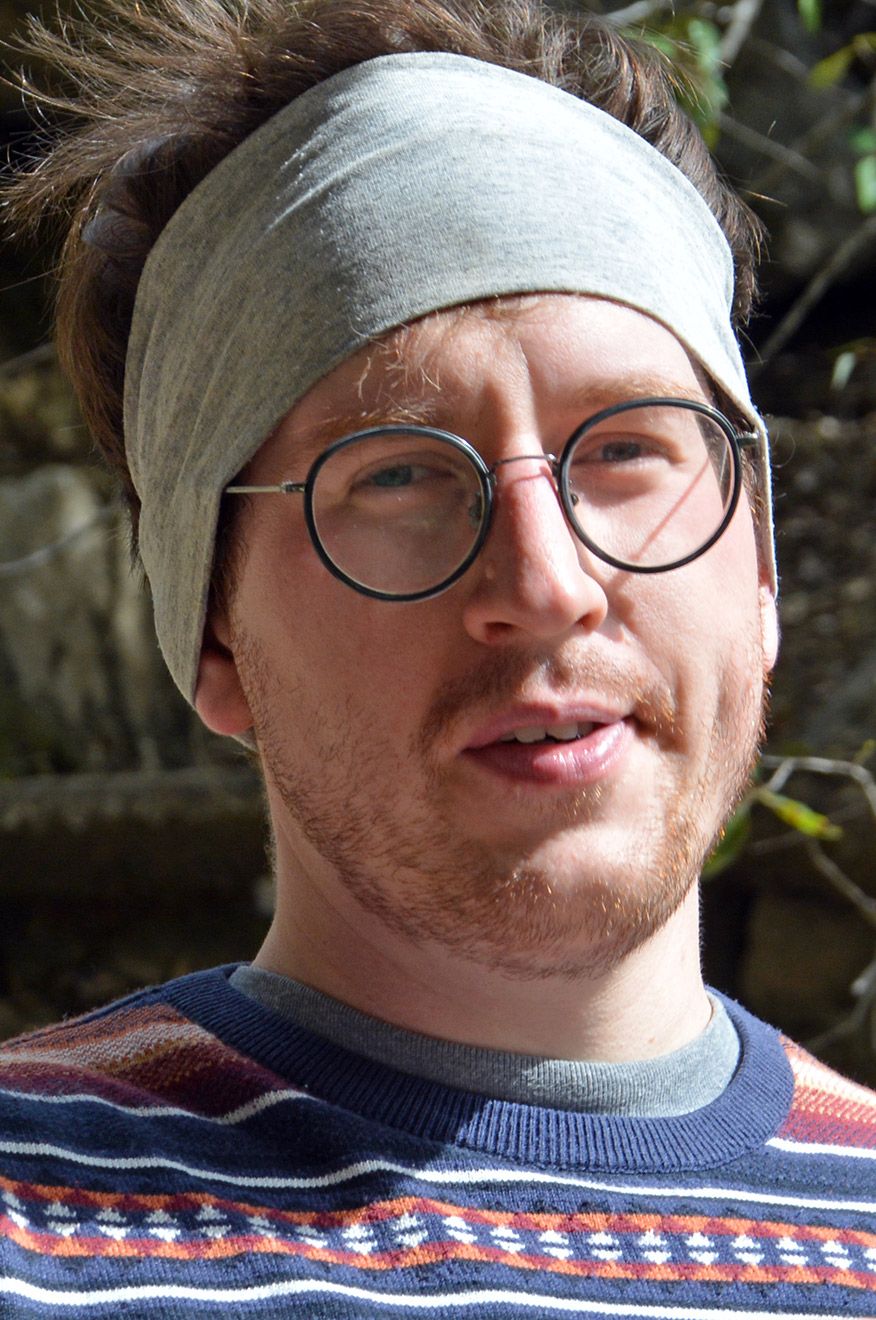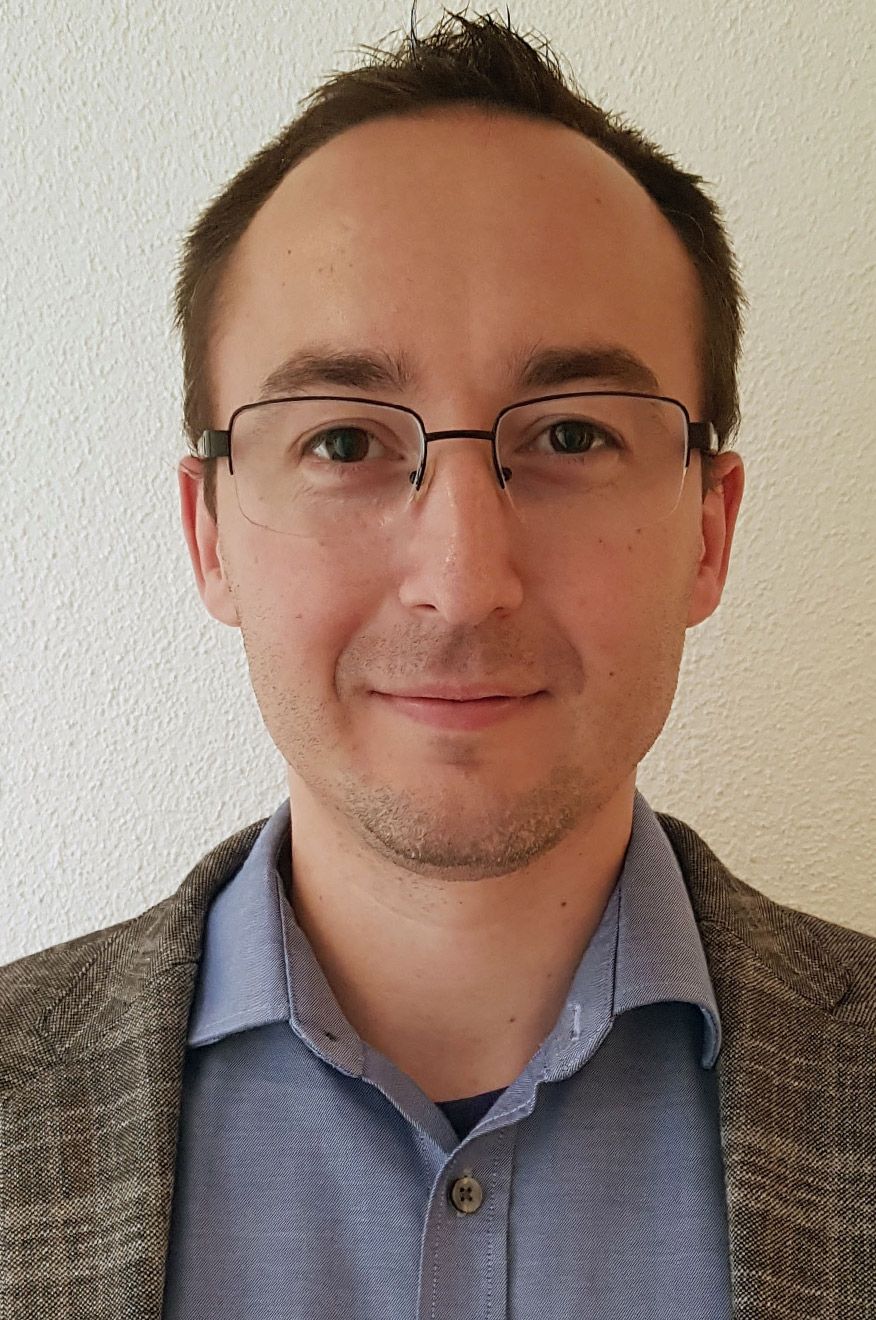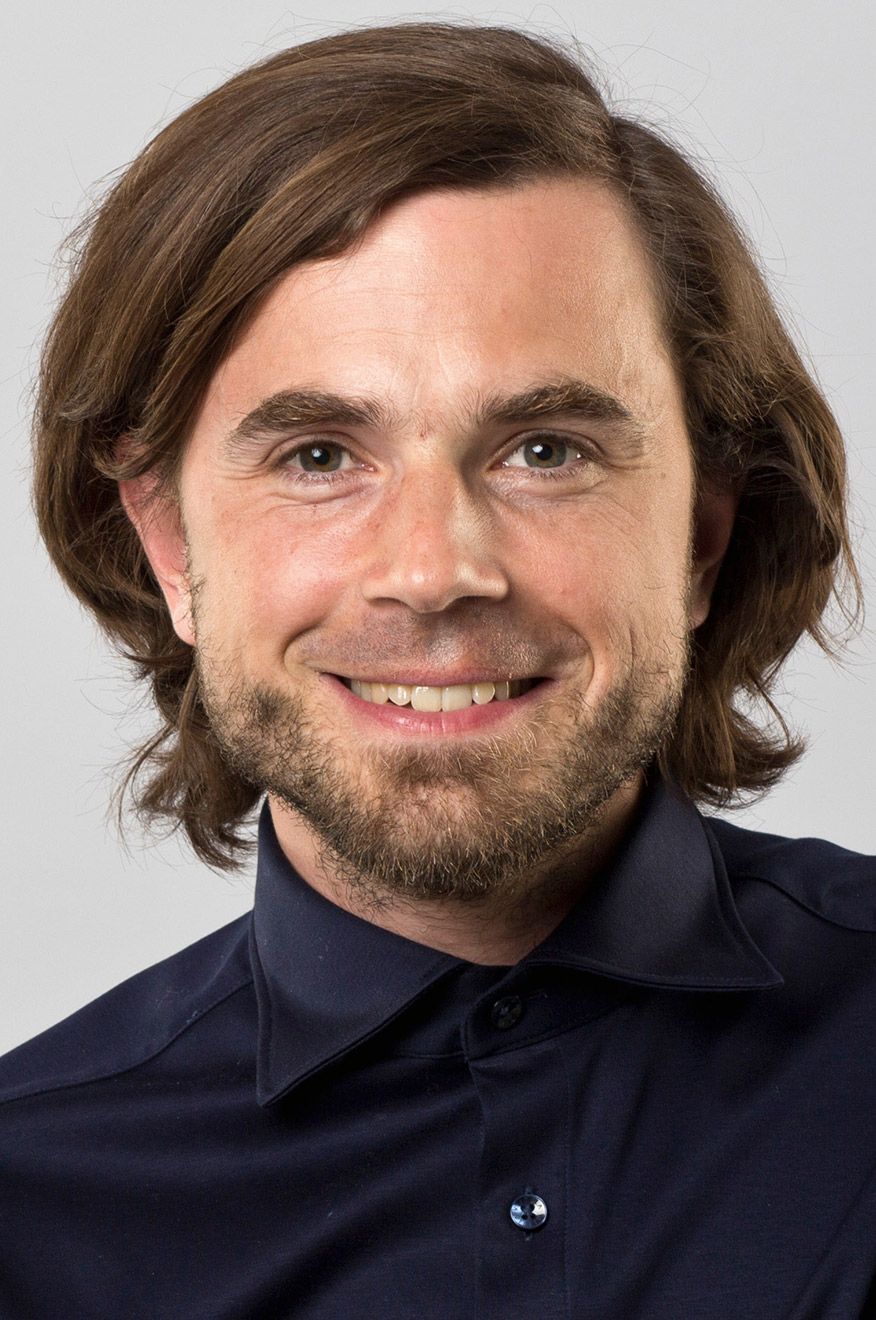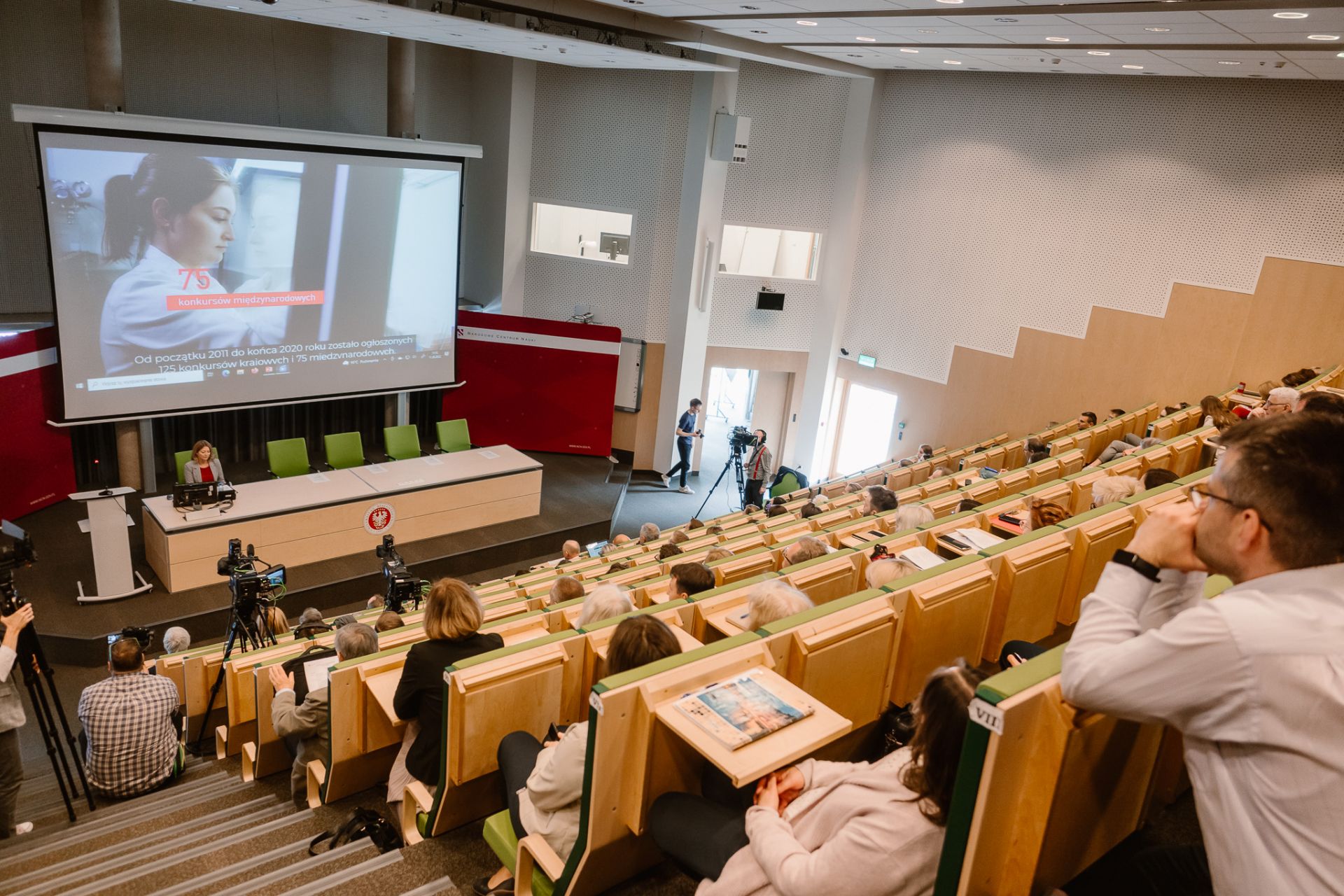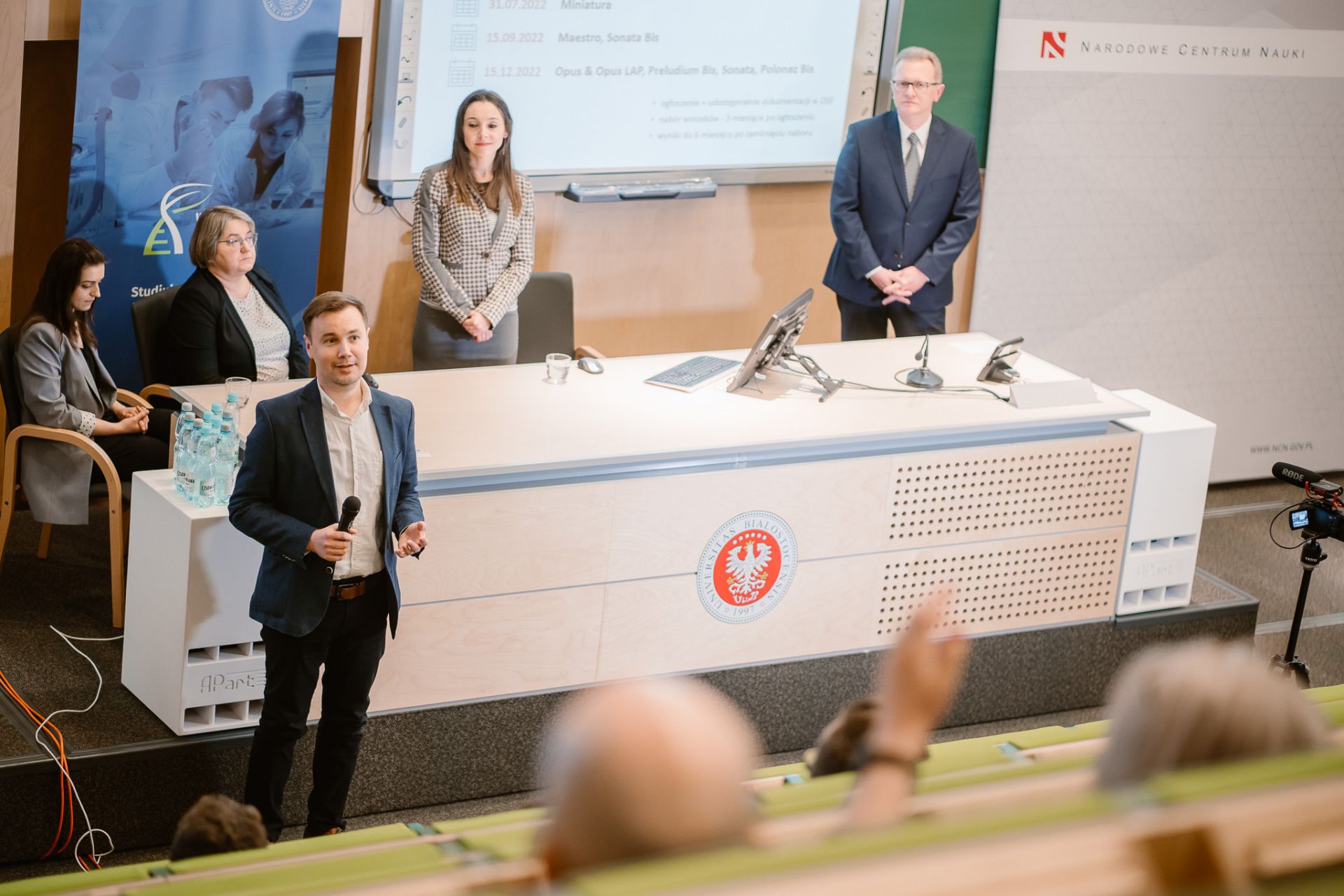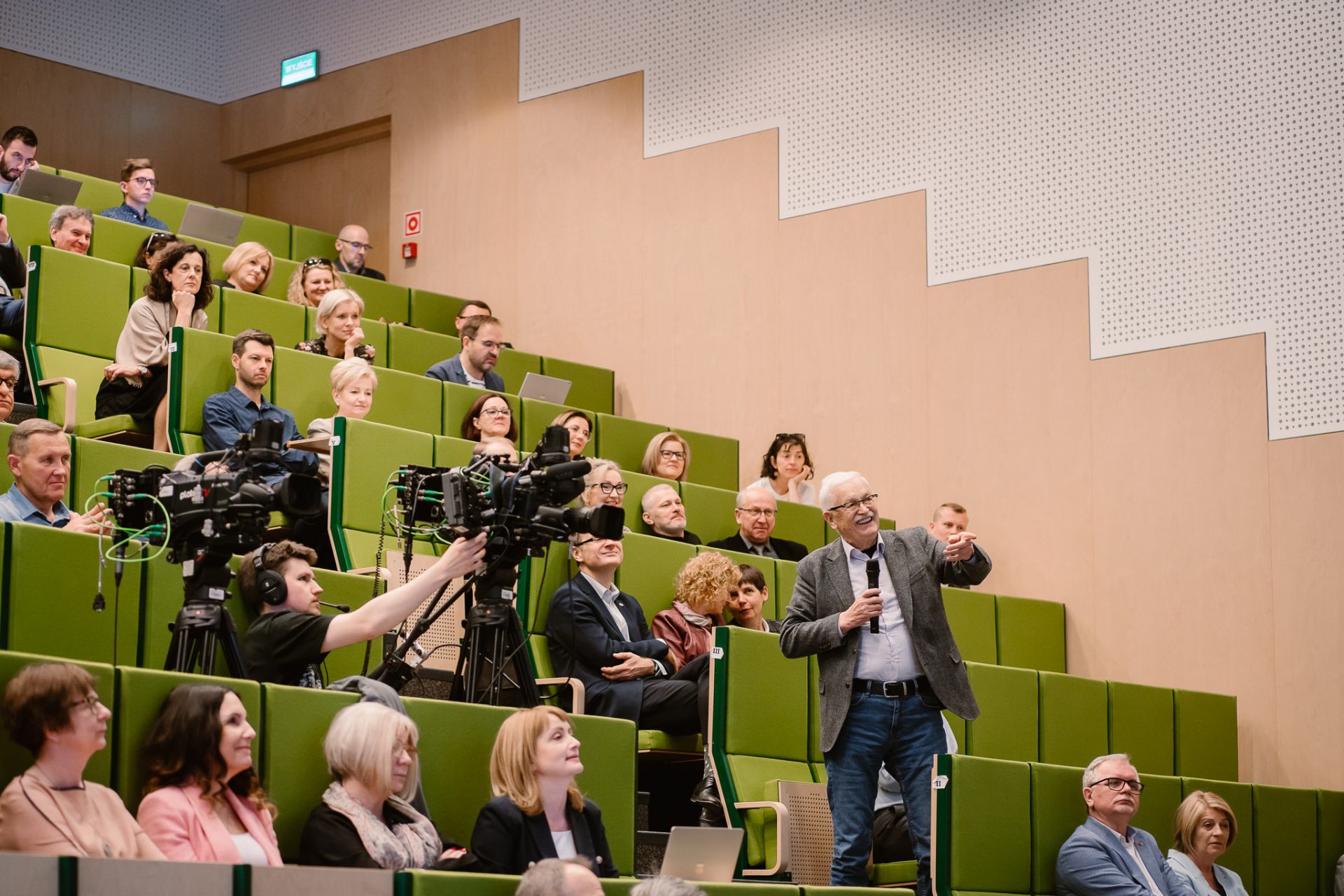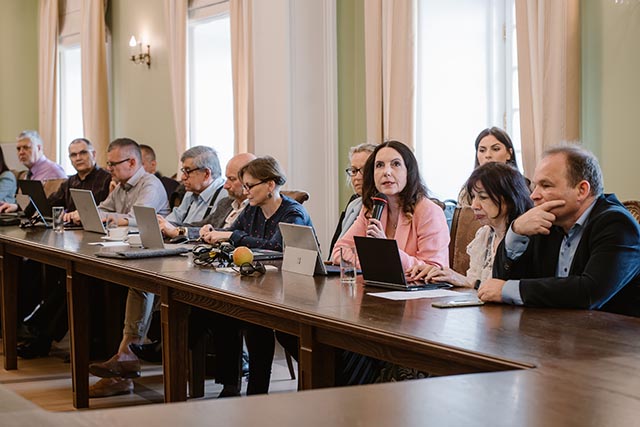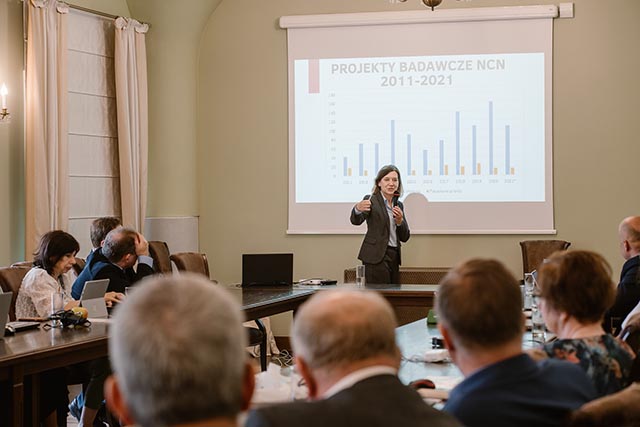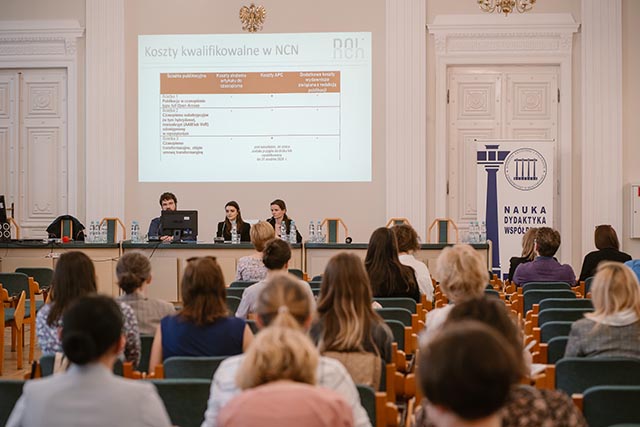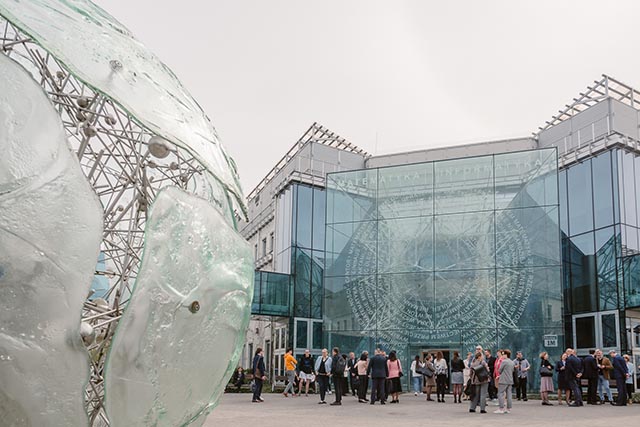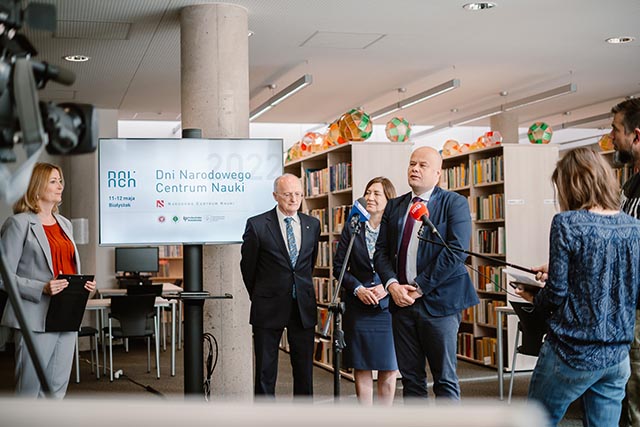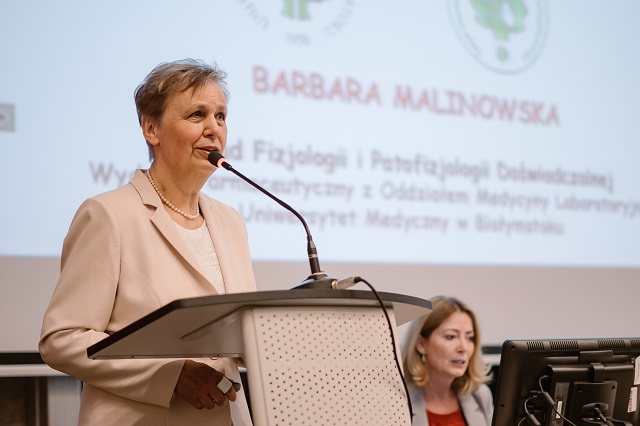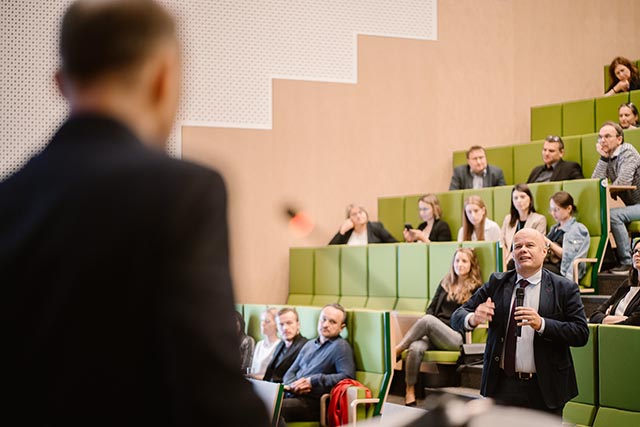MAESTRO 14
15 June 2022
The National Science Centre (NCN) hereby launches the MAESTRO 14 call for research projects for well-established and outstanding researchers aiming to conduct pioneering research, including interdisciplinary research, which is significant for the development of science, goes beyond the current state of the art and that may result in scientific discoveries.
Researchers may be awarded funds to cover remuneration for the research team, including scholarships for students and PhD students, purchase or manufacturing of research equipment and for other costs crucial to the research project.
The MAESTRO 14 call budget is 20,000,000 PLN.
Proposals must be submitted electronically via the OSF submission system available at https://osf.opi.org.pl, in compliance with the proposal submission procedure. The proposal submission procedure is explained in the Guidelines for applicants to complete MAESTRO 14 proposals in the OSF submission system (available in English soon).
The proposal submission deadline in the OSF submission system is 15 September 2022, 4 p.m.
Please read the call documents included in this call text.
Please note: There is a new requirement for principal investigators who have managed a MAESTRO project and are intending to submit another proposal to the current call for proposals.
It has been already mentioned that under MAESTRO 14 principal investigators who have managed a research project funded under MAESTRO may submit a funding proposal for another research project under MAESTRO in so far as they meet at least one of the following conditions:
- they are ERC grant winners,
- they have submitted a grant proposal to the ERC over the past 5 years which has been evaluated at least in stage I of the call.
 Who may submit eligible proposals?
Who may submit eligible proposals?
Proposals in the call may be submitted by the following entities specified in the Act on the National Science Centre (NCN):
1. universities;
2. federations of science and HE entities;
3. research institutes of the Polish Academy of Sciences operating pursuant to the Act on the Polish Academy of Sciences of 30 April 2010 (Journal of Laws of 2020, item 1796, as amended);
4. research institutes operating pursuant to the Act on Research Institutes of 30 April 2010 (Journal of Laws of 2020, item 1383, as amended);
5. international research institutes established pursuant to other acts and acting in the Republic of Poland;
5a. Łukasiewicz Centre operating pursuant to the Act on the Łukasiewicz Research Network of 21 February 2019 (Journal of Laws of 2020, item 2098);
5b. institutes operating within the Łukasiewicz Research Network;
6. Polish Academy of Arts and Sciences;
7. other entities involved in research independently on a continuous basis;
8. groups of entities (at least two entities mentioned in sections 1-9 or at least one institution as such together with at least one company);
9. scientific and industrial centres laid down in the Act on Research Institutes of 30 April 2010 (Journal of Laws of 2020, item 1383);
10. research centres of the Polish Academy of Sciences laid down in the Act on the Polish Academy of Sciences of 30 April 2010 (Journal of Laws of 2020, item 1796);
11. scientific libraries;
12. companies operating as R&D centres within the meaning of the Act on Certain Forms of Support for Innovative Activity of 30 May 2008 (Journal of Laws of 2021, item 706);
13. legal entities with registered office in Poland;
13a. President of the Central Office of Measures;
16. natural persons and;
17. companies conducting research in another organisational form than laid down in sections 1-13a.
 Who may act as the principal investigator?
Who may act as the principal investigator?
The principal investigator must be at least a PhD holder who, in the proposal submission year or over the period of 10 years (between 01.01.2012 and 15.09.2022; this period may not be extended by career breaks referred to in the proposal form) prior the proposal submission year:
- had at least five papers published in renowned Polish or international academic press/journals,
- acted as the principal investigator in at least two research projects funded under national or international calls for proposals (acting as a principal investigator shall also mean managing/ coordinating the work of a research group in international research projects or programmes);
Please note: MINIATURA, UWERTURA, ETIUDA and FUGA are not calls for research projects.
- meets at least three of the following criteria:
- has been a member of a scientific committee of at least one renowned international conference,
- has published at least one monograph,
- has delivered lectures at renowned international conferences,
- has received an international award or prize,
- is or was a member of renowned associations, international scientific organisations or academia,
- has other significant scientific achievements,
and in the case of research in the field of arts, a person who is an author of works of art of international significance or works significant for the Polish culture and has actively participated in international exhibitions, festivals, artistic events in fine arts, music, theatre and film.
Scientific achievements should cover the period of the last 10 years prior to the proposal submission year (as of 2012). In specific cases, the period can be extended (§ 9 (6) (a) of the Resolution on the terms of the MAESTRO call).
Please note: A narrative CV is available from this edition of the call. We recommend to use the annexed (optional) template of the principal investigator’s academic and research track record.
Please note: Principal investigators who have managed a research project funded under MAESTRO may submit a funding proposal for another research project under MAESTRO in so far as they meet at least one of the following conditions:
- they are ERC grant winners,
- they have submitted a grant proposal to the ERC over the past 5 years which has been evaluated at least in stage I of the call.
Please note: At least five papers listed in the principal investigator’s scientific achievements section should have been published in the proposal submission year or over the period of 10 years prior to the proposal submission year (as of 2012).
 Are there any restrictions on submitting proposals for research projects under the NCN calls?
Are there any restrictions on submitting proposals for research projects under the NCN calls?
Yes. Restrictions on submitting proposals are detailed in Chapter III of the Regulations on awarding funding for research tasks funded by the National Science Centre as regards research projects.
One must not act as the principal investigator in more than one research project financed under the MAESTRO call at the same time. Acting as a principal investigator applies to the period from the date of signing the funding agreement to the date of submitting the final report on the project.
The principal investigator must reside in Poland for at least 50% of the project duration period and be available to the participating entity for the project. The foregoing does not apply to documented project-related business trips as well as any holiday, time off work and other excused absences governed by applicable laws.
The principal investigator must be a person employed by the host institution for the research project under an employment contract at least on a half-time basis for the entire project duration period. The employment requirement does not apply to recipients of Social Security pension.
Please note: Principal investigators who have managed a research project funded under MAESTRO may submit a funding proposal for another research project under MAESTRO in so far as they meet at least one of the following conditions:
- they are ERC grant winners,
- they have submitted a grant proposal to the ERC over the past 5 years which has been evaluated at least in stage I of the call.
 What is the subject-matter of the call?
What is the subject-matter of the call?
Proposals may be submitted to the call covering basic research in any of 25 NCN panels comprising three groups:
- HS – Arts, Humanities and Social Sciences;
- ST – Physical Sciences and Engineering;
- NZ – Life Sciences.
 What is the project duration?
What is the project duration?
Under the call, research projects may be planned for a period of 36, 48 or 60 months.
 What are the positions for members of the research team?
What are the positions for members of the research team?
Pursuant to the Regulations, the tasks to be performed under the project include:
- creation of a new full-time post-doc type post(s) for the total period of at least 36 months pursuant to the Types of costs in research projects funded by the National Science Centre;
- engagement of a PhD student(s), for the total period of at least 36 months pursuant to the Types of costs in research projects funded by the National Science Centre;
A post-doc type post is a full-time post designated by the principal investigator for a person who has been awarded a PhD degree within 7 years before joining the project. This period may be extended pursuant to the Types of costs in research projects funded by the National Science Centre.
Please note: A post-doc type post can be occupied by a person who has been conferred a PhD degree by another entity than the one planning to employ him/her at this post or has completed a continuous and evidenced post-doctoral fellowship of at least 10 months in another entity than the participating entity and in another country than the one in which he/she have been conferred a PhD degree. A prospective post-doc must be selected in an open call.
A PhD student who will receive an NCN scholarship for research must be selected in an open call.
Apart from the principal investigator and above-mentioned persons, research tasks in the project funded under the MAESTRO call may be performed by additional investigators, including:
- senior researchers,
- persons occupying a specialist supporting position,
- students.
A senior researcher position is a full-time employment position co-financed by the participating entity employing the senior researcher and scheduled by the principal investigator for a person who has been conferred a PhD degree at least 7 years before the proposal submission date and has the expertise, unique competencies and experience necessary to perform the tasks in the project.
A specialist supporting position is a full-time employment position planned by the principal investigator for a person involved in solving project-related research problems, with specialist knowledge and experience, such as lab-managers, senior technicians, statistical analysts, etc.
Senior researchers and persons occupying specialist supporting positions must meet the requirements laid down in the Regulations.
However, the rationale for involvement of individual members of the research team in the project shall be evaluated by the expert team. The project must include the description of competencies and tasks to be performed by individual members of the research team. For more information on the budget for remuneration and scholarships, go to the Types of costs in research projects funded by the National Science Centre.
The terms of the call do not specify the maximum number of research team members.
 How can the project budget be planned?
How can the project budget be planned?
The project budget must be well-justified as regards the subject and scope of research, based on realistic calculations and must specify the expenditures to be covered by the NCN (eligible costs).
The terms of the call do not specify the total minimum or maximum amount of funding that can be requested.
The project budget (eligible costs) includes direct and indirect costs.
Direct costs include funds for:
- remuneration for the principal investigator: 220,000 PLN per annum if the principal investigator is employed full-time and up to 10,000 PLN per month if the principal investigator is employed otherwise;
- remuneration for co-investigators:
- senior researcher position: 70,000 PLN per annum. PLEASE NOTE: The senior researcher position must be co-financed by the participating entity in the amount of at least 70,000 PLN per annum;
- full-time remuneration for post-docs: 140,000 PLN per annum (which may be increased in well justified cases);
- salaries and scholarships for students and PhD students (a total of 15,000 PLN per each month of project implementation);
- the so-called additional remuneration for members of the research team; if the principal investigator is not to be employed full-time in the project, his/her remuneration is paid from the pool allocated for additional remuneration;
- purchase or manufacturing of research equipment, devices and software;
- purchase of materials and small equipment;
- outsourced services;
- business trips, visits and consultations;
- compensation for collective investigators and
- other costs crucial to the research project which comply with the Types of costs in research projects funded by the National Science Centre.
Please note: The costs of publication of monographs resulting from research projects, as defined in §10 of the Regulation on evaluation of the quality of research activity issued by the Minister of Science and Higher Education on 22 February 2019 (Journal of Laws of 2019, item 392) are not eligible until positively reviewed by the NCN.
Indirect costs include:
- indirect cost of Open Access (up to 2% of direct costs) that may only be spent on the cost of open access to publications or research data;
- other indirect costs (up to 20% of direct costs) that may be spent on the costs that are related indirectly to the research project, including the cost of open access to publications and research data.
If unjustified costs are planned, a proposal may be rejected.
 Open access publication of research results
Open access publication of research results
Together with other European research-funding institutions, the National Science Centre is a member of cOAlition S. Therefore, the NCN has adopted its Open Access Policy pursuant to which all research results stemming from NCN-funded research projects must be made available in immediate open access.
In accordance with the principles of Plan S, the National Science Centre recognizes the following publication routes as compliant with its open access policy:
- publication in open access journals and on open access platforms registered, or with pending registration, in the Directory of Open Access Journals (DOAJ);
- publication in subscription journals (hybrid journals), as long as the Version of Record (VoR) or the Author Accepted Manuscript (AAM) is published, by the author or publisher, in an open repository immediately upon the article’s online publication;
- publication in journals covered by an open access licence within the framework of so-called transformative agreements, inscribed in the Efficiency and Standards for Article Charges registry (ESAC-registry).
More information on open access publication can be found in order No. 38/2020 + amendment.
 Can proposals in this call include application for state aid?
Can proposals in this call include application for state aid?
Yes, unless funds are applied for by a natural person. For more information, go to the State aid section.
If a project is carried out in an entity, for which funding constitutes state aid, funds for students and PhD students may only be planned as remuneration for students and PhD students specified in the Types of costs in research projects funded by the National Science Centre.
Please note: All documents concerning proposals for state aid must be signed with a qualified electronic signature in the PAdES format.
 What is the proposal evaluation procedure?
What is the proposal evaluation procedure?
Proposals are subject to an eligibility check and merit based-evaluation.
Eligibility check is carried out by the scientific coordinators. Only complete proposals that meet all requirements of the call text are recommended for merit-based evaluation. A proposal may also be rejected as ineligible at the later stage of evaluation.
Eligible proposals are subject to merit-based evaluation performed in two stages:
Stage I:
- individual reviews are drafted by two members of the Team and presented at the first session. In the case of a proposal which is assigned an auxiliary NCN review panel specifying disciplines covered by NCN review panels other than the one to which the proposal was submitted, the chair of the team may decide to seek another review from a member of another team;
- the team decides on the evaluation of the proposal based on the individual reviews;
- a list of proposals recommended for stage II is agreed upon; and
- justifications for the final decision on proposals not recommended for stage II of evaluation are drafted.
The data included in the proposal and annexes thereto (with the exception of the full project description) are evaluated throughout stage I.
Please note: Proposals which are assigned at least one auxiliary review panel from another panel than the one to which they are submitted and identified by the chair as requiring an additional individual review are deemed interdisciplinary proposals. In well-justified cases, interdisciplinary proposals are subject to an additional expert review at the stage I of evaluation.
Stage II:
- individual reviews are made by at least two reviewers based on the data included in the proposal and annexes thereto, with the exception of the short project description. In specific cases, derogations are allowed from the number of individual reviews. The coordinator must justify the reasons for the derogation to the Director;
- the reviews drafted by the reviewers are presented by the experts at the second session;
- an interview with the principal investigator is held by the experts, of which the principal investigator must be notified 14 days in advance;
- the Coordinator must provide the principal investigator, within 7 days before the interview, with the reviews of the proposal drafted by the experts and reviewers;
- the principal investigator must participate in the interview held in Polish or in English at the NCN’s offices. The language of the interview depends on the terms of the call and composition of the committee. In MAESTRO, interviews are held in English;
- in exceptional and well-justified cases, the NCN will allow for an interview to be held via available telecommunications tools;
- failure to attend the interview is regarded as withdrawal from applying for funding in the call;
- the final decision on the proposal is agreed upon by the team based on the reviews drafted by the reviewers and results of the interview;
- a ranking list of proposals is compiled, specifying proposals recommended for funding; and
- justifications for the final decisions are drafted for proposals not recommended for funding.
An interview with the principal investigator at stage II of the merit-based evaluation will be held in English in January/ February 2023.
Additional information on the proposal evaluation procedure can be found in the Detailed procedure for evaluating proposals by the expert teams.
Please note: The short and full project descriptions must only be drafted in English.
 What is reviewed in the evaluation of proposals?
What is reviewed in the evaluation of proposals?
The evaluation of proposals focuses in particular on:
- compliance with the criteria of basic research,
- principal investigator’s compliance with the criteria of well-established and outstanding researcher laid down in §6 of the Resolution on the terms and conditions of the MAESTRO call,
- quality and innovative nature of research or tasks to be performed,
- impact of the research project on the advancement of the scientific discipline,
- assessment of the feasibility of the research,
- scientific achievements of the principal investigator, including publications in renowned academic press/ journals,
- assessment of the results of research projects conducted by the principal investigator and funded by the NCN or from other sources,
- relevance of the costs with regards to the subject and scope of the research, and
- preparation of the proposal and compliance with other requirements set forth in the call text.
Please note: Proposals with a zero score or “no” decision agreed by the expert team in any reviewed criterion must not be recommended for funding. The foregoing does not apply to the data management evaluation criteria and evaluation criteria of ethics issues in research.
 Who performs the merit-based evaluation of proposals?
Who performs the merit-based evaluation of proposals?
Proposals are evaluated by inter-panel teams (consisting of experts from respective panels, i.e. HZ, ST or NZ).
In the case of a proposal which is assigned an auxiliary review panel specifying disciplines covered by other NCN panels than the one to which the proposal is submitted, the chair of the expert team may decide to seek a second opinion from a member of another expert team.
Experts are selected by the NCN Council from among eminent Polish and foreign researchers who are at least PhD holders. Expert teams are established for each call edition. The composition of the expert team is subject to the number and subjects of proposals submitted to each panel.
 When and how will the results be announced?
When and how will the results be announced?
The call results will be published on the NCN website and communicated to the applicants by way of a decision of the NCN Director within 6 months of the proposal submission date, by March 2023 at the latest.
 Where can additional information be found?
Where can additional information be found?
For more information on the call, read the Information for applicants on the NCN website and Guidelines for applicants to complete MAESTRO 14 proposals.
Should you have any more questions or queries, please contact us by e-mail: informacja@ncn.gov.pl or telephone:
.
 Useful information
Useful information
If you are intending to submit a proposal to MAESTRO 14:
- read all call documents included in the call text, in particular:
- Terms and conditions of the MAESTRO 14 Call,
- Proposal form template where you can find out about information and annexes needed to complete the electronic proposal form in the OSF submission system,
- Regulations on awarding funding for research tasks funded by the National Science Centre as regards research projects,
- Proposal submission procedure,
- collect data from the applicant that is required to complete the proposal and find out about the internal procedures that may affect the proposal and project performance (project costs, procedure for acquiring signature(s) of authorised representative(s) of the institution to confirm submission of the proposal); if the proposal is submitted by a group of Polish entities, draw up a Research project cooperation agreement, and
- prepare letters of acceptance from publishers confirming that the paper has been accepted for publication (when the scientific achievements section includes papers accepted for publication but not published yet).
Before the proposal is submitted to NCN:
- check if all information in and annexes to the proposal are correct. Verification of the proposal for completeness in the OSF submission system by pressing the Sprawdź kompletność [Check completeness] button does not guarantee that information has been entered correctly and that the required annexes have been attached;
- make sure that all tabs are completed in the correct language;
- disable editing of the final version of the proposal to NCN; and
- download the confirmation of proposal submission that needs to be signed by the principal investigator and authorised representative(s) of the host institution.
Once the proposal is completed and all required annexes are attached, use the Wyślij do NCN [Send to NCN] button to submit the proposal to the NCN electronically via the OSF submission system.
Upon the end of the call for proposals:
- evaluation of proposals will be carried out,
- after each stage of evaluation, the funding decision of the NCN Director will be announced,
- if the proposal is recommended for funding, a funding agreement will be entered into and
- the project will be carried out pursuant to the funding agreement and Regulations on the implementation of research projects, fellowships and scholarships.
In the event of a breach of the call procedure or other formal infringements, the applicant may appeal against the decision of the NCN Director with the Committee of Appeals of the NCN Council. The appeal must be lodged within 14 days of the effective delivery of the decision.
Call documents
- Terms and conditions of the MAESTRO call
- Regulations on awarding funding for research tasks funded by the National Science Centre as regards research projects
- NCN panels
- Regulations on awarding scholarships in the NCN-funded research projects
- Costs in research projects funded by the National Science Centre
- MAESTRO proposal form template
- Guidelines for applicants to complete MAESTRO 13 proposals
- Research project cooperation agreement
- State aid
- Guidelines for applicants to complete the Data Management Plan form in the proposal
- Guidelines for applicants to complete the Ethics Issues form in the research project
- NCN's Open Access Policy + amendment
- Guidelines: NCN's Open Access Policy
- Code of the National Science Centre on research integrity and applying for research funding
- Proposal submission procedure
Documents applicable to the evaluation of proposals:
- Proposal evaluation criteria
- Expert Teams of the National Science Centre – formation and appointing
- Detailed procedure of evaluating proposals by expert teams
- Service of decisions of the NCN Director
- Guidelines for applicants to appeal against the NCN Director’s decisions
Documents to be read before starting an NCN project:
- MAESTRO agreement template
- Order establishing a procedure for conducting audits on host institution’s premises
- Guidelines for entities auditing the implementation of research projects funded by the National Science Centre
- Evaluation of monographs in research projects funded by the National Science Centre

